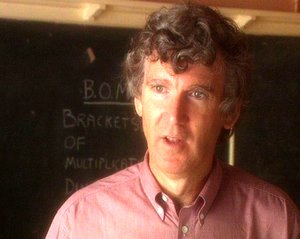
'“What is this conflict about? Why do people fight all the time? What’s the basis of personality that makes conflict inevitable?” And it’s the sort of questions that lead you onto either psychology or [being] a dramatist.’
David Williamson interviewed by George Negus for the ABC, 2004
David Williamson’s output is formidable. He’s had over 40 plays staged since 1968 and has written over 20 filmed screenplays. He turns 70 on 24 February and shows little sign of retiring. In late 2011, he had a new play opening in Sydney and the film of his play Face to Face (2011, coming soon to ASO) screening in cinemas.
Face to Face is typical Williamson, tackling hot-button issues in a confrontational setting. A hotheaded construction worker rams his ex-boss’s Jaguar and the disputants face off at a community conference. Williamson’s work takes the maxim 'drama is conflict’ to heart, and many of his best films – including Don’s Party (1976) and The Club (1980) – feature explosive meetings and arguments as set-pieces.
Here’s Williamson on the difference between writing for film and the stage:
[On] stage, the medium for telling a story is virtually dialogue and body language of the actors. In film, the visual image is a third channel through which your story’s told, and a very important channel. You can do facial close-ups, you can do atmosphere, you can do mood.
Williamson has contributed original screenplays and adaptations of other people’s work to award-winning films like Gallipoli (1981) and The Year of Living Dangerously (1982) for Peter Weir, Phar Lap (1983) and, more recently, Balibo (2009).
These are all significant historical films that concern Australia’s national identity and place in the world. Williamson continues to tackle these themes on a smaller scale in the theatre by putting vivid Australian characters and vernacular on stage, something he’s now done for over 40 years.
- David Williamson – credits on ASO.
- A list of Williamson theatre productions at Ausstage.
- Face to Face movie website.
- Transcript of Williamson’s 2004 interview with George Negus, quoted above.










